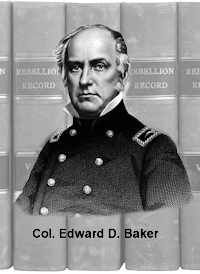March 22.—At Nashville, Tenn., Andrew Johnson delivered an eloquent and impressive address, on political affairs. There was nothing new in the remarks of the Governor, he merely dwelling upon the Northern views of the war, its origin and purposes; but he was listened to by many men, secessionists in sentiment, but former political friends of the Governor, who cannot fail to be influenced by his honesty.
—Yesterday a National reconnoissance in force was made from Camp Cumberland Ford to Cumberland Gap by infantry, cavalry and artillery. On arriving within one and a half miles of the Gap, an advance guard was thrown out, which came in contact with the rebel pickets and drove them in. A few shots were exchanged without loss. The forces encamped last night, building the fires out of range of the enemy’s guns. Considerable snow fell during the night.
Shortly after day this morning, firing commenced with skirmishes from the Unionists, to which the enemy responded from rifle-pits, now and then throwing a shell. The artillery was then brought into the field, some timber cut, and firing began in earnest. During tho day the battery, Capt Wetmore’s, fired about one hundred and fifty shots, while the rebels fired some two hundred, very few of that number reaching the position of the Union forces. No one was injured on the National side, nor was it known that any injury was done to the rebels, the distance being so great.— Louisville Democrat, March 29.
—A Union meeting was held in Fairfax Court-House, Va., this day. Speeches were made by Charles H. Upton, J. C. Underwood, and others. Resolutions were adopted expressing thanks to President Lincoln and Secretary Seward for their sagacity and wisdom in managing our domestic and foreign affairs, and appealing to Gov. Pierpont to order an early election for county officers.
—The Senate of Massachusetts to-day unanimously passed resolutions eulogizing Lieut.-Col. Merritt, Adjutant Stearns, and other lamented men of Massachusetts, who fell at the battle of Newborn.
—A Skirmish occurred between a detachment of the Sixth Kansas regiment and Quantrell’s band, near Independence, Mo. The latter were routed with seven killed. The Unionists lost one killed, and captured eleven prisoners and twenty horses. The rebels killed two of the Unionists, and burned the bridge over the Little Blue River.
—A Scouting party from the New-York Sixty-first regiment, while passing down the railroad from Manassas toward Warrenton, Va., were fired upon by a party of cavalry, supposed to belong to Stuart’s regiment Upon making a demonstration toward the assailants, the rebels fled in great haste. It was undoubtedly their intention to pick off a man or two; but they were fortunately beyond range, and thus failed in their object— N. Y. Herald, March 26.
—The Newbern (N. C.) Progress made its appearance to-day under new auspices, and altogether new management, with the following salutatory:
“We come before the people of North-Carolina an earnest advocate of that glorious Union which her patriotic ancestry so nobly aided to cement and establish.
“The Progress has been heretofore one of the most virulent and bitter opposers to the Government in the South, and its former proprietor, not satiated with treason already committed, has filled his cup of bitterness by openly taking up arms against the Union which so long fostered and nourished him.”
The Progress is edited by George Mills Joy, and is published by E. L. Davenport & Co.

 Saturday March 22nd 1862
Saturday March 22nd 1862

 London, March 21,1862
London, March 21,1862


